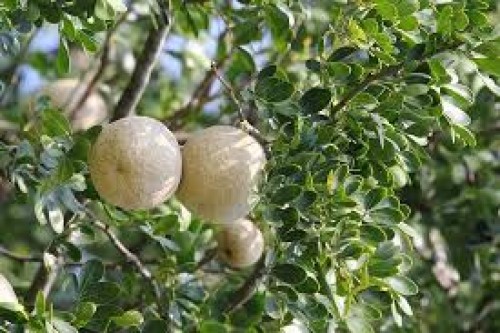off
-
Sold
-
_Plant.jpg)
-

out
Bel Wood Apple: A Versatile and Beneficial Tree
The Bel Wood Apple, also known as Aegle marmelos, is a tropical tree native to the Indian subcontinent. It is a hardy tree that has been celebrated for its numerous benefits, both medicinal and nutritional. The tree is also culturally significant, often associated with the Hindu deity Lord Shiva.
Care and Growing Conditions
Bel trees thrive in tropical and subtropical climates, preferring well-drained, sandy, or loamy soil. They are relatively low-maintenance and can withstand harsh conditions, including drought and high heat, making them ideal for dry regions. Here are the key care tips for growing a Bel tree:
- Sunlight: Bel trees prefer full sun and should be planted in a location that receives at least 6–8 hours of sunlight per day.
- Watering: While the tree is drought-tolerant, regular watering during the early stages of growth helps the tree establish a strong root system. After that, it can manage with minimal watering.
- Soil: Ensure the soil is well-drained, as the tree does not do well in waterlogged conditions.
- Pruning: Regular pruning of dead or damaged branches helps maintain the tree's health and encourages healthy new growth.
- Temperature: It thrives in temperatures ranging from 25°C to 40°C (77°F to 104°F).
Advantages and Benefits of Bel Wood Apple
Bel Wood Apple offers a range of health benefits, making it a valuable addition to any garden:
- Medicinal Properties: The fruit of the Bel tree has numerous medicinal benefits. It is commonly used to treat digestive issues, such as constipation, diarrhea, and indigestion. The fruit pulp and leaves are also known for their anti-inflammatory and antimicrobial properties. Bel is often used in traditional medicine to treat fever, wounds, and ulcers. Additionally, Bel is rich in antioxidants and is believed to have detoxifying properties.
- Nutritional Value: The fruit is a good source of vitamins, especially vitamin C, and is rich in dietary fiber, making it beneficial for overall health. It is also known to be a natural coolant, helping to regulate body temperature, which is especially helpful during hot weather.
- Cultural Significance: The Bel fruit is sacred in Hinduism and is often used in religious rituals, especially in offerings to Lord Shiva. It is believed that offering Bel leaves to the deity brings good fortune.
- Sustainability: Bel trees are hardy and require minimal care, making them suitable for sustainable agriculture in drought-prone areas. Their ability to thrive in harsh environments makes them an eco-friendly choice for afforestation and reforestation efforts.
Uses of Bel Wood Apple
The Bel tree has several uses across various fields:
- Culinary Use: The fruit is used to make drinks, jams, jellies, and sweets. It has a distinct, tangy flavor that adds a refreshing taste to beverages. In India, a popular drink called "Bael Sharbat" is made by extracting juice from the Bel fruit, which is enjoyed for its cooling properties.
- Medicinal Use: The pulp of the fruit is used in the preparation of medicinal tonics and remedies. It is effective in treating stomach ailments and boosting digestive health.
- Wood: The wood of the Bel tree is dense and durable. It is used in crafting furniture, utensils, and sometimes in the construction of small structures.
Conclusion
The Bel Wood Apple is an exceptional tree that not only provides a wide range of health benefits but also serves as a cultural symbol. Its resilience, coupled with its medicinal and nutritional properties, makes it an essential plant in many regions. Whether you're looking to benefit from its fruit, use it in traditional medicine, or enjoy its ornamental beauty, the Bel tree is a remarkable addition to any garden.

